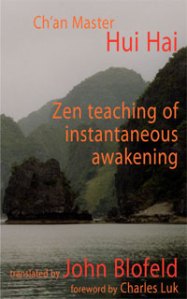
While passing the winter of 1959-60 in Kalimpong, a flower-girt townlet in the Himalayan foothills, I spent several hours a day seated at the feet of one or other of those saintly and learned monks who had recently fled their Tibetan monasteries in search of a haven where they could preach the dharma without restraint or fear. Alas, my ignorance of Tibetan made me woefully dependent upon the services of that kind and patient Tibetan scholar and linguist, John Driver, who gave most generously of his time. Even so, I could not banish my sorrow at being so near and yet so cut off from monks with such precious knowledge to impart. Then one day when I was gazing disconsolately at Kanchenjunga’s majestic snowscape, the thought came to me that I was wasting valuable time in regrets as useless to myself as to others. Knowing nothing of Tibetan or Sanskrit, I did at least know something of Chinese Buddhist texts; my Zen Teaching of Huang Po, though far from being a masterpiece of translation, was even then affording some people an insight into the marvellous workings of an enlightened mind. So why not try again?
Thereupon, my thoughts flew back to a temple secluded in a long, low valley in West China where, during the Second World War, I had gone from my post at our embassy in Chungking to recuperate from illness. Today I do not even remember the temple’s name, but I shall not easily forget what befell me there. It is strange (and no doubt a symptom of our need for books such as the Great Pearl’s [Hui Hai]) how quickly the most delicious pleasures pall. Living in that peaceful temple, with nothing to do all day long beyond reading, sipping tea with friendly monks and gazing out at the beautiful pine-crowned ridges to either side of the fertile valley, I presently found myself bored! Beauty and idleness, to which years of hard work and a month of illness had made me look forward with all my heart, had all too quickly lost their charm. The aged monk-librarian, noticing with his shrewd old eyes my need for distraction, took me to spend a morning with him in the library — a large pavilion almost as big as the main shrine hall of the temple. Inside, I found most of it occupied not by books, but by thousands of delicately incised boards of the kind formerly used for printing Chinese texts. Many of them were centuries old and bore vertical rows of characters so exquisitely formed that I was able to pass several happy hours handling and admiring them; but my state of health had left me weak and presently I felt the need to seek my bedroom, which opened off the shrine hall on the other side of the courtyard. Just as I turned to go, the old monk smilingly placed in my hands a copy of one of the ancient texts block-printed from the boards I had been examining.
Back in my room, which even at midday was rather dark, I lighted a red votive candle and began idly glancing through the pages of the old gentleman’s gift. It proved to be a reprint of an eighth-century (T’ang dynasty) text composed by the Ch’an Master Hui Hai, together with a selection of his dialogues with his disciples. Almost at once I came upon an arresting quotation to the effect that sages seek from mind and not from the Buddha, whereas those who seek from the Buddha and not from mind are fools! This sharply awakened my curiosity, for it seemed extraordinary that a pious Buddhist writer should thus castigate those who seek something from the teacher of gods and men. Anyone might be forgiven for finding such words blasphemous — as I did until I had read the whole book and begun to experience the first glimmer of understanding. There and then, I decided to try my hand at translating this intriguing work.
ADVERT: for Hui Hai’s Zen Teaching of Instantaneous Awakening by John Blofeld, now available on Kindle at Amazon.co.uk and Amazon.com.
Read a few more posts on Zen master Hui Hai.
Categories: Biography, Book reviews, Books, Buddhism, Chan / Seon / Zen, Encyclopedia, History, Tibetan


Thank you for sharing with me, something you hold close to your heart. * smiles* A blessing its been speaking with you about John. What a nice surprise to see your blog this morning. I wish you peace. Sharon
I have The Zen Teaching of Huang Po, Taoism The Road To Immortality, The Wheel of Life, and My Journey in Mystic China. John was blessed with the gift of writing. However, considering the places he’s been, the things he’s seen, experienced, he left this incarnation with a sense he didn’t make good use of his time. For as he said, he was in search of enlightenment, and it was not his to find. Perhaps what he did realize was that IT isn’t something one finds outside of ones self, but that IT waits to be discovered within. He was still too attached to the world and its numerous amusement parks. Nonetheless, his writings stand on their own, and were a blessing to me as I traveled along with him. * bows* Blessings… Sharon
Heard John give a talk once, Sharon, it was very inspiring.
His books have been a great teaching to me and I expect to many others. When we (BPG) wrote to him about reprinting Hui Hai, he was very happy about it, and we later got a very nice letter from him thanking us for doing it. He sadly died just 17 days later.
R